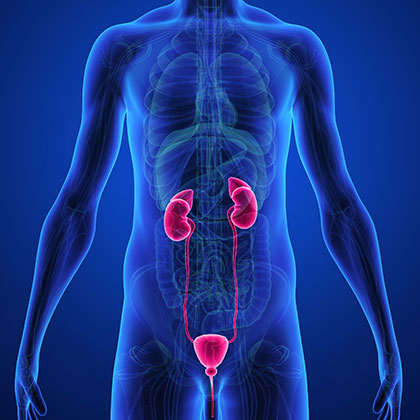
If you have an interest in digestive health you may well have come across the term leaky gut syndrome. But what is it, what symptoms does it cause and can it be treated?
What is leaky gut syndrome?
Leaky gut syndrome is a proposed digestive condition. It’s said to be caused by substances such as bacteria and toxins ‘leaking’ through gaps in the intestinal wall and into the bloodstream, where they can be carried to the body’s organs. The idea is that, once they’ve leaked through, these substances can cause a wide range of problems and symptoms. These include digestive upsets such as bloating and abdominal pain as well as depression, anxiety, joint pain, fatigue and skin issues such as acne, plus several others.
Is leaky gut ‘real’?
Leaky gut syndrome isn’t currently recognised as a diagnosable condition by many doctors and healthcare professionals. Gut experts remain sceptical about the concept of a ‘leaky gut’, and unfortunately there is no definitive test to diagnose the syndrome and confirm its existence. As a consequence, the topic remains highly controversial in the healthcare space (i).
What causes leaky gut?
Since leaky gut syndrome is still not recognised by most practitioners in the general medical community, it’s difficult at present to say exactly what causes it. However, the concept of leaky gut syndrome is based on something called increased intestinal permeability (or hyperpermeability). Everything you eat and drink passes through your intestines and is either absorbed or turned into waste matter along the way. Your intestines have a special lining that acts as a barrier, keeping any potentially harmful substances you ingest inside the gut but at the same time allowing water and digested nutrients to pass into the bloodstream.
With increased intestinal permeability, the permeability of the intestinal lining is higher than it should be. Imagine there are tiny openings in the intestinal lining that allow water and nutrients to pass through: if you have increased intestinal permeability it means the gaps have become bigger. And that could let potentially harmful substances enter the bloodstream .
Increased intestinal permeability is widely acknowledged in people with chronic gastrointestinal conditions such as coeliac disease, Crohn’s disease and ulcerative colitis. However many health professionals do not support the idea that increased intestinal permeability is the underlying cause of any condition. Instead they say it’s just a symptom of certain chronic digestive conditions. In other words, there’s no evidence that increased intestinal permeability is a disease (or syndrome) in itself, or that it causes any other diseases.
However it’s also fair to say there hasn’t been a great deal of scientific research on increased intestinal permeability and its possible role as a cause of other health problems. And what limited evidence there is comes from animal and lab studies – which means it’s not robust enough to make a strong case for leaky gut syndrome in humans.
Since interest in the concept of leaky gut syndrome is increasing, more research will most likely be carried out in the future. And depending on the outcome of any new research, the current conventional medical opinion could well change. Until then it may be a good idea to be aware of the idea of leaky gut syndrome and the conditions it might cause – and, most importantly, to know how to improve your digestive health in general.
Other possible triggers of leaky gut syndrome
Some researchers (ii) have suggested that – besides chronic intestinal disorders such as inflammatory bowel disease and coeliac disease – other conditions and factors may increase intestinal permeability, including:
-
Obesity
-
Nonalcoholic fatty liver disease and nonalcoholic steatohepatitis
-
Chronic heart disease
-
Type 1 diabetes
-
Dysbiosis (an imbalance in gut bacteria)
-
Infections such as Helicobacter pylori (a common bacterial stomach infection)
-
Antibiotics and other medicines including anti-inflammatory drugs (eg aspirin and ibuprofen)
-
Excessive alcohol consumption
-
Unbalanced diet (in particular eating too much sugar, carbs and fat)
Leaky gut symptoms
People who support the existence of leaky gut syndrome believe the toxins and bacteria that pass into the rest of the body as a result of increased intestinal permeability can trigger one or more of the following general symptoms:
-
Abdominal pain
-
Skin problems
Those who are sceptical about the idea of leaky gut syndrome argue all these conditions can be explained by any number of other health issues. Meanwhile backers of leaky gut syndrome claim prolonged increased intestinal permeability might trigger a chronic inflammatory response that could lead to a wide range of conditions such as:
How do you diagnose leaky gut?
Currently there’s no standard test to check for increased intestinal permeability to confirm the presence or absence of leaky gut syndrome. However some that are being investigated include:
-
Urine tests (including the so-called mannitol and lactulose test)
-
Blood tests (these may, for instance, look for antibodies or toxins that suggest there are gut bacteria in your bloodstream)
-
Intestinal tissue biopsy
-
Confocal endomicroscopy (a type of endoscopy test that analyses your intestinal lining in high resolution)
How to improve your gut health
Improving your gut health in general may help keep your intestinal barrier healthy. Some of the things you can do to help support a healthy gut include:
-
Staying physically active
-
Getting the right amount of sleep
-
Tackling stress
-
Drinking alcohol in moderation
-
Limiting your use of anti-inflammatory drugs (your doctor can give you advice on how to protect your gut if you have to take anti-inflammatories on a regular basis)
-
Eating a healthy, balanced, low-fat diet with limited amounts of sugar and refined carbohydrates
Certain nutrients may be beneficial for gut health by keeping intestinal permeability at a healthy levels too, such as:
Vitamins A and D
Scientists claim both vitamins have important roles in regulating the gastrointestinal system in general, and a few studies may indicate they help control certain elements of the intestinal barrier (ii).
Plant foods rich in vitamin A include green leafy vegetables such as kale, spinach and broccoli, and orange, red and yellow vegetables including carrots, tomatoes, red peppers, sweet potatoes, pumpkins and squash. Animal sources include fish oils, milk, eggs and liver. Vitamin A is also found in many fortified foods. Alternatively, you can supplement with vitamin A or beta carotene, which is converted to vitamin A in the body and is suitable during pregnancy and breastfeeding.
Our main source of vitamin D, on the other hand, is sunlight (your skin makes its own vitamin D when it’s exposed to bright sunlight). It’s also found in a limited number of foods including oily fish, egg yolks, meat, offal and fortified foods. Because it’s difficult to get all the vitamin D you need from food alone, we’re all advised to take a supplement during the autumn and winter months (or throughout the year if you don’t get much or any sun exposure) (iii). A good multivitamin and mineral supplement is a convenient way to supplement for both vitamins.
Zinc
A few studies show that zinc deficiency is linked with increased intestinal permeability. One small-scale study with 12 human volunteers suggests taking zinc supplements may improve increased intestinal permeability in those who have Crohn’s disease in remission, and that taking zinc could help reduce the likelihood of them relapsing (iv).
To make sure you’re getting enough zinc in your diet, try eating oysters, crab, lobster, red meat and dairy foods, as well as plant foods such as beans, nuts, whole grains and fortified foods. If you want to try a zinc supplement, look for one that contains zinc citrate, as it’s thought to be absorbed more readily than some other forms of zinc. You can also get a daily dose of zinc in a multivitamin and mineral supplement – however make sure it contains a good level of zinc (15mg is usually the amount recommended).
Live bacteria
Since an imbalance of the bacteria found in your gut may be one of the factors in the development of increased intestinal permeability, it may also be a good idea to make sure you’re getting plenty of the ‘good’ kind. You can do this by adding more foods rich in beneficial bacteria – or probiotics – to your diet or by taking a live bacteria supplement (or both).
Two of the most commonly found types of live bacteria in foods and supplements are lactobacillus acidophilus and bifidobacterium bifidum, both of which are found in large numbers throughout the gut.
Foods rich in live bacteria include fermented foods such as some pickles, sauerkraut, kefir, kombucha, kimchi, tempeh, sourdough bread and miso, as well as some dairy foods including certain types of yoghurt and cheese. A good-quality supplement can also help main your gut bacteria balance – for more information about probiotics including where to get them and how to choose a supplement, read our guide What are the benefits of live bacteria?
Soluble fibre
Found in carbohydrate foods, natural soluble fibre is a prebiotic – a substance that ‘feeds’ the beneficial live bacteria in your gut (which is another way to help keep your gut bacteria balance healthy). There are several types or groups of prebiotics including fructo-oligosaccharides (FOS), which you can find in foods such as garlic, onions, asparagus, bananas, chicory, wheat, soya beans, leeks and barley. FOS is also available in supplements, including powders that can be sprinkled on foods and even used as a sweetener thanks to its naturally sweet taste.
Find out more about FOS and other types of soluble fibre in our guide to prebiotics.
Glutamine
The most abundant amino acid found in the body, glutamine is often taken to help gut function, including treating diarrhoea (v). Researchers have also suggested it may affect the membranes of intestinal cells, helping them to maintain their permeability (iii). It has also been suggested that glutamine may be particularly effective as a gut health nutrient when combined with probiotics (iii).
Glutamine is a non-essential amino acid because your body makes some itself. But you can get it in foods too, including fish, seafood, dairy foods, meat, eggs, nuts, seeds, red cabbage, dark leafy greens, red kidney beans and soya beans (and foods made from soya). It is also available as a supplement and is a popular sports supplement as it’s found in high amounts in muscle tissue.
Want to learn more?
If this guide has whetted your appetite there’s lots more information to discover about keeping your gut healthy as well as the lowdown on a range of digestive conditions in the digestive health section of our pharmacy health library.
References:
-
Available online: https://patient.info/news-and-features/how-your-stomach-affects-your-overall-health
-
Aleman, RS., Moncada, M., Aryama, KJ., Leaky Gut and the Ingredients That help Treat It: A Review. Molecules 2023 Jan; 28(2): 619. Available online: https://www.ncbi.nlm.nih.gov/pmc/articles/PMC9862683/
-
Available online: https://www.nhs.uk/conditions/vitamins-and-minerals/vitamin-d/
-
Sturniolo, GC. et al. Zinc Supplementation Tightens “Leaky Gut” in Crohn’s Disease. Inflamm Bowel Dis 2001 May; 7(2): 94-8. Available online: https://academic.oup.com/ibdjournal/article/7/2/94/4719408
-
Available online: https://www.webmd.com/vitamins/ai/ingredientmono-878/glutamine#
You Might Also Like
Disclaimer: The information presented by Nature's Best is for informational purposes only. It is based on scientific studies (human, animal, or in vitro), clinical experience, or traditional usage as cited in each article. The results reported may not necessarily occur in all individuals. Self-treatment is not recommended for life-threatening conditions that require medical treatment under a doctor's care. For many of the conditions discussed, treatment with prescription or over the counter medication is also available. Consult your doctor, practitioner, and/or pharmacist for any health problem and before using any supplements or before making any changes in prescribed medications.

Christine
Christine Morgan has been a freelance health and wellbeing journalist for almost 20 years, having written for numerous publications including the Daily Mirror, S Magazine, Top Sante, Healthy, Woman & Home, Zest, Allergy, Healthy Times and Pregnancy & Birth; she has also edited several titles such as Women’ Health, Shine’s Real Health & Beauty and All About Health.
View More



